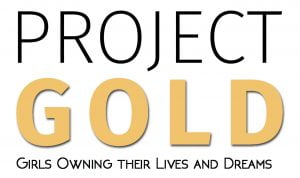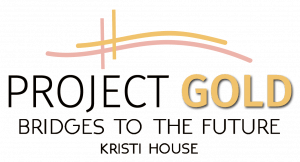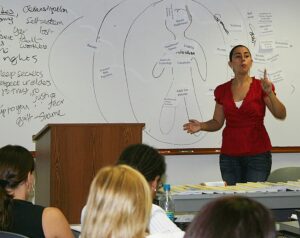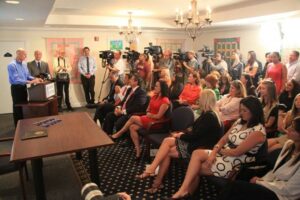Project GOLD = Girls Owning their Lives and Dreams.

Project GOLD brought the legal and provider community together around the issue of child sex trafficking in 2007, and has been a leader nationally on the issue. The Project GOLD Drop In Center uses a strengths-based, survivor-led approach to provide health, social and legal services linkages, mental health support and educational enrichment to sexually exploited girls. Kristi House partners with Survivors’ Pathway with the help of funding by the Office on Trafficking in Persons (OTIP) within the U.S. Department of Health and Human Services, Administration for Children and Families to provide outreach and services to LGBTQ youth overcoming sex trafficking, see more about Project TEAM here.
What is Project GOLD & Who is it for?
Project GOLD began the first Drop-In Center in Florida and continues operating the only ones in South Florida offering safe space and individualized wrap-around services exclusively for youth who identify as female who have experienced or are at risk of commercial sexual exploitation.
Today, Project GOLD operates a home-like Drop-In Center in Miami-Dade County where members are empowered to develop their strengths in a non-judgmental, trauma-informed environment. They supported by staff who provide mentoring, advocacy, therapy, career coaching and academic support.
Project GOLD encourages referrals from public and private agencies, members of the Human Trafficking Multidisciplinary Team, caregivers and others. Referrals should include whether trafficking or at-risk behaviors are indicated and the services needed.
The Drop-in Center is open on weekdays with special after-hour accommodations provided as needed. The Drop-In Center is in an undisclosed location to protect the safety and privacy of members. For further information, please call Project GOLD at 305-547-6850.
How does Project GOLD work?
Project GOLD encourages girls to actively engage in services and participate in a wide array of group programs offered at the Drop-In Center. Project GOLD specialists help girls to identify, progress and meet their individualized goals, providing support and incentives for educational and employment achievements.
Since its inception, Project GOLD was shaped and directed by survivor input, reflected in the program name created by founding clients: Project GOLD = Girls Owning their Lives and Dreams. Since its founding in 2007, Project GOLD has evolved to be survivor led and uses a multi-tiered mentorship approach for service delivery.
While Project GOLD works as a team for each member, we also recognize that one-to-one relationship-building is essential. Therefore, each girl who becomes a member of Project GOLD is assigned specific staff members such as a Mentor, Therapist, Youth Advocate, Academic Specialist, and Career Coach, based on their needs.
There is no charge for Project GOLD services.
Transportation is available.
Drop-In Center Location: Central Miami
Project GOLD
Main: (305) 547-6850
Project GOLD Services
- MENTORS Project GOLD has a team of trained Mentors with lived experience and expertise in commercial sexual exploitation who assist in engaging the members into services, helping them identify and engage in healthy prosocial activities and assisting to reduce high risk behaviors. Members are able to work toward facilitating groups and becoming peer mentors if they desire, once they have advanced in the final steps in the mentoring program.
- YOUTH ADVOCATES provide comprehensive care management services to members through identification of their individual and family needs, linkage and referral to services, and support through the steps and activities needed to achieve their personalized goals.
- THERAPISTS provide evidence-based treatments such as Trauma-Focused Cognitive Behavioral Therapy (TF-CBT) adapted for trafficking, and Risk Reduction through Family Therapy (RRFT) for youth and their caregivers to address trauma, high risk behaviors, and family dynamics. Therapists work with members on development of coping, safety/prevention, parenting, and other necessary skills.
- CAREER COACHING is also provided through Project GOLD’s Bridges to the Future program offering individualized employment support to help members develop their knowledge, tools, and skills necessary to explore, obtain, and maintain job and career opportunities.
- EDUCATIONAL SUPPORT & ACADEMIC ENRICHMENT services are provided by the Bridges to the Future Education Specialist and partners who identify, monitor, and address individualized needs, challenges, strengths, interests, goals and progress.
- TUTORING is also available. Members can come in for individualized tutoring sessions while still being able to participate in some groups as needed or recommended.
- GROUP PROGRAMS are offered Monday through Thursday between 4 and 7 pm during the regular school year and with alternate scheduling and activities during holiday breaks and in the summer.
- TRANSPORTATION is key to the program and population served. Two vans transport members in both the north and the south parts of Miami-Dade County, bringing girls to a Drop-In Center for afternoon programs, individual appointments and other needs.
- COMMUNITY & PROFESSIONAL EDUCATION, TRAINING & OUTREACH is available for school staff, law enforcement, community-based organizations and others. Trainings can focus on the basics or provide an in-depth examination of how to start a child trafficking response program. We focus on identification of victims, risk factors, impacts, psycho-social needs and engaging the youth. Outreach presentations are also conducted for at-risk youth including the national evidence-based Not a Number ™ trafficking prevention program.
Group Programming
- LIFE SKILLS: These groups are designed to help develop knowledge and skills pertaining to activities of daily living so that members are better equipped to meet demands and challenges of everyday life. Examples of life skills groups include Cooking & Baking, Financial Literacy & Money Management, Cultural Awareness, Interpersonal & Social Skills, Health & Sexual Education as well as Yoga, Fitness and Dance classes.
- SURVIVOR-LED GROUPS: Facilitated by Mentors, these groups are designed to provide a safe space for members to openly communicate with their peers in order to assist them in feeling accepted and understood. A broad range of topics are selected based on members’ needs and present life circumstances. Members are able to work with Mentors toward co-facilitating groups as they advance in the program.
- THERAPEUTIC & SUPPORT GROUPS: Psycho-education and skill development help members learn about trauma, mental health, and how to identify and manage their emotions, behaviors, relationships and conflicts in a supportive, trauma-informed environment. Grounded in evidence-based treatment interventions, groups enable members to realize and develop strengths and skills from one another as well as from the trained clinical staff co-facilitators.
- EMPLOYMENT CURRICULUM: As part of its Bridges to the Future program, Project GOLD offers a multi-module group curriculum designed to develop members’ employment readiness and job maintenance skills. The employment group merges traditional work-related areas and skills with hands-on learning experiences and activities while using a trauma-informed approach.
- PARTNERSHIPS: Project GOLD collaborates with community groups to offer specialized programs for members. A long-standing favorite is led by The Motivational Edge which focuses on lyrical expression, teaching members about composing, performing and recording music while enabling them to express themselves in a safe space.
- NOT A NUMBER™: This evidence-based program features an interactive, five-module prevention curriculum designed to teach youth how to protect themselves from human trafficking and exploitation through information, critical thinking, peer support and skills development.
- FIELD TRIPS AND HOLIDAYS: In addition to group programming, Project GOLD offers a plethora of other pro-social activities for members during school breaks and holidays. Celebrations and holiday dinners, outings into the community for educational and recreational activities, and other special events are offered to members.
Bridges to the Future
 Project GOLD Bridges to the Future is addressing this vital component with one-to-one counseling, educational and vocational support and connections in the community to identify strengths, forge linkages and routes out of trafficking.
Project GOLD Bridges to the Future is addressing this vital component with one-to-one counseling, educational and vocational support and connections in the community to identify strengths, forge linkages and routes out of trafficking.
Bridges to the Future is providing vocational/skills training, tutoring, financial counseling, job readiness assistance, education programs, and assistance with educational and professional certifications, internships and apprenticeships. Key staff bring vocational and career counseling experience to the program with a Faculty Team comprised of several highly experienced university researchers and community professionals providing project guidance to make a difference in girls’ futures. This program is supported by a major grant from the U.S. Department of Justice and private funders, and will build upon service to some 500 girls since Project GOLD began.
Hidden Child Sexual Abuse Victims
There is a strong link between childhood sexual abuse and CSEC (Child Sex Trafficking). Approximately 90% of exploited youth were sexually and/or physically abused in the home. Because of the abuse, a child might run away or be thrown out of the home whereby he or she becomes extremely vulnerable to exploitation in the streets.
Among children who are living on the streets, research has suggested that a third are lured into sex trafficking within 48 hours of leaving home. Most of these cases occur in major cities such as Miami, where most minors are exploited by a trafficker. Once they fall into the hands of a trafficker, they are repeatedly subjected to various forms of psychological, physical and sexual abuse as a means of breaking their will and extracting obedience. They are also transported frequently from city to city to further isolate them and meet client demand. Escaping a life of exploitation proves incredibly difficult for most children and youth.
History and Background
Kristi House and the Miami-Dade community forged an unprecedented community partnership when agencies which were likely to have contact with child victims of sex trafficking and youth at risk came together in 2007.

Some 30 agencies answered the Kristi House call to action and in September 2007 participated in the first training led by GEMS Founder and Director Rachel Lloyd, leader of one of the very few programs in the country at the time. A needs assessment completed by attendees showed that at least 67% of the organizations represented had juvenile clients who were forced into commercial sexual exploitation or pornography, a total of 180 known CSEC victims were seen by at least one agency in the past year. Although more than half of the respondents agreed that CSEC was an important policy or service issue for their organization, only 14% had had the opportunity to attend a CSEC training.
Recognizing the need to better serve victims and to increase knowledge and community collaboration around this issue, the community representatives agreed to form a coalition – the Miami-Dade CSEC
Work Group – and meet regularly to share information and strategize ways to better serve the victims in Miami, one of our country’s top hubs for child sex trafficking.
From 2009 to 2012, Kristi House led the charge with community partners advocating for the passage of The Florida Safe Harbor Act. This law forever changed the way the state recognizes commercial sexually exploited children as victims of a crime, not criminals. It passed in 2012 and became law January 1, 2013.
Community Partners
The Miami-Dade CSEC Work Group made considerable progress, quickly, with providers participating in ongoing training and bringing it back to their agencies. Working in uncharted territory to establish protocols involving large, disparate organizations, they supported Kristi House’s leadership around the issue locally, statewide and nationally with training and advocacy initiatives. The CSEC Work Group brought attention to the issue in South Florida and was a leader in the state.
Key community partners continue to include the State Attorney’s Office, Miami-Dade Police, Miami-Dade County Juvenile Services, State of Florida Dept. of Children and Families and the HT-MDT Committee members, Citrus Health Network, University of Miami Miller School of Medicine and Thrive Clinic, Shared Hope International Restorative Work Group, and GEMS, among many others.
The Kristi House CSEC program was named Project GOLD in 2009 – “Girls Owning their Lives and Dreams” – a name chosen by the youth involved. The Project strives to engage this special population for services, encourage their healing, and pave the way for their future success.
Training Leadership
Over a decade ago Kristi House became a training provider through the U.S. Department of Justice for the CSEC Community Intervention Project (CCIP) and since that time has been disseminating education and training programs and sharing what it learns through Project GOLD throughout the United States. Kristi House has trained more than 18,000 professionals in CSEC and presented the topic at dozens of major conferences. Its “CSEC 101” course is approved by Florida Department of Children and Families for meeting the required three-hour training for providers seeking to work with sex trafficking victims.
Several articles on Kristi House’s work and research findings have been published in scholarly journals.
Peer-Reviewed Research:
- (2021) Survivors of Commercial Sexual Exploitation: Experiences Working in Service Organizations, Journal of Human Trafficking, DOI: 10.1080/23322705.2021.1946334 (PDF)
- Kenny, M. C., Helpingstine, C., Long, H., & Harrington, M. C. (2020). Assessment of commercially sexually exploited girls upon entry to treatment: Confirmed vs. at risk victims. Child Abuse & Neglect, 100, 104040. https://doi.org/10.1016/j.chiabu.2019.104040 (PDF)
- Maureen C. Kenny, Claire Helpingstine, Roberto L. Abreu & Francesco Duberli (2019): Understanding the needs of LGBTQ clients and their risk for commercial sexual exploitation: Training community mental health workers, Journal of Gay & Lesbian Social Services, DOI: 10.1080/10538720.2019.1568338 (PDF)
- Maureen C. Kenny, Claire Helpingstine, Haiying Long, Lorena Perez & Maria Clara Harrington (2019): Increasing Child Serving Professionals’ Awareness and Understanding of the Commercial Sexual Exploitation of Children, Journal of Child Sexual Abuse, DOI: 10.1080/10538712.2018.1563264 (PDF)
- Kenny, M. C., Helpingstine, C. E., & Weber, M. (2018). Treatment of a Commercially Sexually Abused Girl Using Trauma-Focused Cognitive Behavioral Therapy and Legal Interventions. Clinical Case Studies, 18(1), 18–35. https://doi.org/10.1177/1534650118800809 (PDF)
- Maureen C. Kenny, Claire E. Helpingstine, Maria Clara Harrington & Adriana G. McEachern (2018): A Comprehensive Group Approach for Commercially Sexually Exploited Girls, The Journal for Specialists in Group Work, DOI: 10.1080/01933922.2018.1484540 (PDF)
- Kenny, M. C., Vazquez, A., Long, H., & Thompson, D. (2017). Implementation and program evaluation of trauma-informed care training across state child advocacy centers: An exploratory study. Children and Youth Services Review, 73, 15–23. https://doi.org/10.1016/j.childyouth.2016.11.030
Funded by:
- The Batchelor Foundation
- The Children’s Trust
- Kathleen Kennedy Foundation
- Ocean Reef Community Foundation
- The Miami Foundation
- Key Biscayne Women’s Giving Circle
- Joseph H. & Florence A. Roblee Foundation
- U.S. Department of Justice, Office for Victims of Crime
- U.S. Department of Health and Human Services, Administration for Children and Families, Office on Trafficking in Persons
- Regions Bank
- Victims of Crime Act grant funding from Florida Office of the Attorney General



